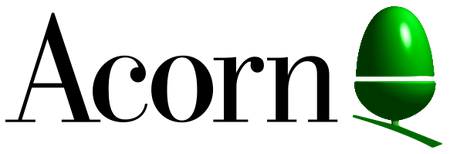No edit summary Tag: sourceedit |
No edit summary Tag: sourceedit |
||
| Line 1: | Line 1: | ||
[[File:Acorn_Computers_logo.svg|center|450px]] |
[[File:Acorn_Computers_logo.svg|center|450px]] |
||
| − | Acorn Computers was a British company born in 1978. Their history in games is marked primarily by two computer systems, the 8-bit [[BBC Micro]] and the 32-bit [[Archimedes|Acorn Archimedes]]. The BBC Micro was built by Acorn at the behest of, well, the British Broadcasting Company in 1981, particularly as part of their BBC Computer Literacy project. This system dominated the British education system as the computer of choice for the school environment, and also enjoyed success in the home market. However, its lower-cost cousin, the Electron, was not as successful as expected, causing the company some serious financial difficulties |
+ | Acorn Computers was a British company born in 1978. Their history in games is marked primarily by two computer systems, the 8-bit [[BBC Micro]] and the 32-bit [[Archimedes|Acorn Archimedes]]. The BBC Micro was built by Acorn at the behest of, well, the British Broadcasting Company in 1981, particularly as part of their BBC Computer Literacy project. This system dominated the British education system as the computer of choice for the school environment, and also enjoyed success in the home market. However, its lower-cost cousin, the Electron, was not as successful as expected, causing the company some serious financial difficulties. |
| + | |||
| + | In 1987, Acorn continued its computer line with the Archimedes, which quickly replaced the niche its predecessor had filled, while simultaneously being one of the most powerful home computers available during the late 80's and early 90's. However, during the mid-90's Acorn lost its market to Apple and IBM, and after making a few more attempts, effectively dissolved in 1998. |
||
| + | |||
| + | Yet, Acorn's legacy lives on in [https://en.wikipedia.org/wiki/ARM_architecture ARM], the world's most popular processor architecture, present in almost every smartphone today. |
||
[[Category:Company]] |
[[Category:Company]] |
||
Revision as of 06:47, 12 January 2017
Acorn Computers was a British company born in 1978. Their history in games is marked primarily by two computer systems, the 8-bit BBC Micro and the 32-bit Acorn Archimedes. The BBC Micro was built by Acorn at the behest of, well, the British Broadcasting Company in 1981, particularly as part of their BBC Computer Literacy project. This system dominated the British education system as the computer of choice for the school environment, and also enjoyed success in the home market. However, its lower-cost cousin, the Electron, was not as successful as expected, causing the company some serious financial difficulties.
In 1987, Acorn continued its computer line with the Archimedes, which quickly replaced the niche its predecessor had filled, while simultaneously being one of the most powerful home computers available during the late 80's and early 90's. However, during the mid-90's Acorn lost its market to Apple and IBM, and after making a few more attempts, effectively dissolved in 1998.
Yet, Acorn's legacy lives on in ARM, the world's most popular processor architecture, present in almost every smartphone today.
All items (3)





